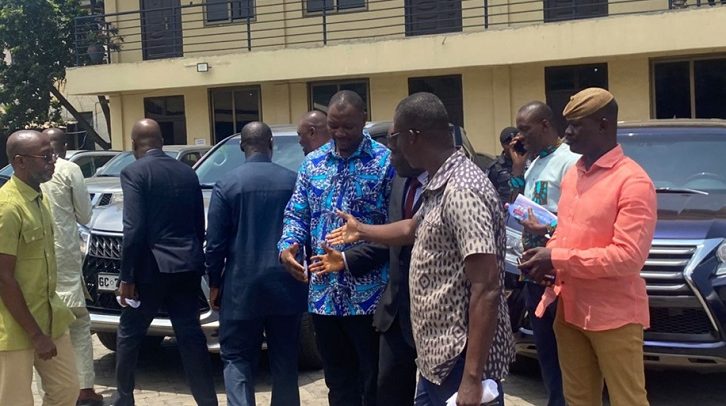The NDC MPs and some of their cohorts
The Minority in Parliament engaged the police yesterday to strike an agreement on the details of its planned protest against management of the Bank of Ghana (BoG) at its head office on September 5, 2023.
Led by Deputy Minority Leader, Emmanuel Armah Kofi Buah, the NDC MPs held a closed-door meeting with the police at the Greater Accra Regional Police Headquarters.
Mr. Buah later told the media that all preparations had been finalised for the upcoming protest against the management of BoG.
The NDC MPs on Monday wrote to the police to notify them of an impending protest march against Dr. Ernest Addison, Governor of the bank, and his deputies.
The letter, signed by Dr. Cassiel Ato Forson, leader of the Minority group, stated that the demonstration, scheduled for Tuesday, September 5, 2023, would be carried out in partnership with some civil society organisations (CSOs) and other progressive forces.
The notification to the police is in accordance with sections 1, 2, and 3 of the Public Order Act 1994 (Act 491), according to the letter, and the purpose was to express their outrage over an alleged illegal printing of money (about GH¢80 billion) by BoG for the Akufo-Addo government between 2021 and 2022.
According to the NDC MPs, the action led to a hyper-inflation rate of 54.1% in December 2022, pointing out, “This singular act of BoG has negatively impacted livelihoods and businesses and pushed about 850,000 Ghanaians into poverty in the year 2022 alone.”
“As representatives of the Ghanaian people, the Minority in Parliament is totally disgusted by the crass mismanagement and reckless mishandling of the affairs of the Bank of Ghana, which resulted in a gargantuan loss of GH¢60.8 billion and a negative equity of GH¢55.1 billion in 2022, with its attendant hardships on Ghanaians,” the letter said in part.
It stated further that they would also protest the “many acts of financial malfeasance by the Governor, his Deputies, and Directors of the Bank of Ghana as contained in the 2022 Annual Report and Financial Statement of the Bank.”
According to the NDC MPs, the protest will begin at Parliament House and proceed to Osu Cemetery Traffic Light, the Ministry of Finance, the High Court Complex, Kinbu, Makola, Rawlings Park, Opera Square, and the Bank of Ghana.
They stated that the protest march will culminate in front of the central bank, where they will picket to demand the immediate resignation of the governor, deputy governors, and the bank’s Board of Directors.
BoG Response
Meanwhile, the BoG has indicated that when COVID-19 occurred, it made several key actions to prevent Ghana’s economic collapse by supporting the economy.
According to the bank, Section 30(6) of the Bank of Ghana Act (612), as modified, was activated, and the Central Bank purchased $10 billion in COVID-19 bonds to assist the economy throughout the pandemic.
The bank said in a statement that this was done within the applicable laws governing the BoG, noting, “When section 30 (6) of the Bank of Ghana Act (612), as amended, is triggered, it allows the Governor, the Minister for Finance and the Controller and Accountant General to agree on a new limit of central bank financing.”
“The law further says that the Minister of Finance will then have to inform Parliament, and the Minister has since informed Parliament as part of his briefing to update Parliament on the International Monetary Fund programme and status of the Domestic Debt Exchange,” the Governor, Dr. Ernest Addison said.
He also refuted the claim that Ghana’s current financial situation will have a negative influence on the bank’s operations, adding that the International Monetary Fund (IMF) Technical Assistance mission validated this decision.
“In their opinion, the Bank of Ghana was policy solvent and would remain so, as it had enough income to cover monetary policy operational costs,” the Governor disclosed.
According to him, the IMF alluded that the Bank of Ghana had sufficient capital amounting to about 15% of its total liabilities.
“Its recommendation was for the Bank to retain all profits and a reassessment should be made in the year 2027. The Bank will also manage to reduce its operational costs during this period,” the Governor pointed out.
“In all these, the Bank of Ghana has acted within the applicable laws. It is not true that the Bank of Ghana has been providing financing for the government every year,” the Governor added.
He stated that there has been zero financing in 2017, 2018, 2019 and 2021.
By Ernest Kofi Adu


